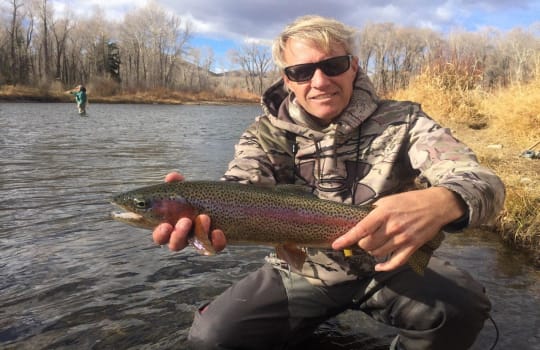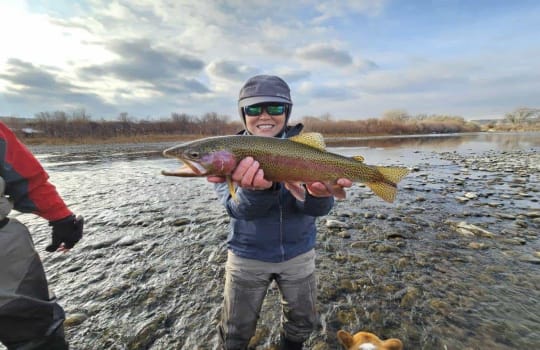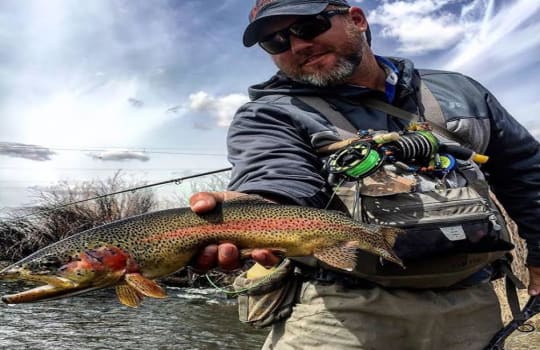Don’t Let Runoff ‘Put You Down’
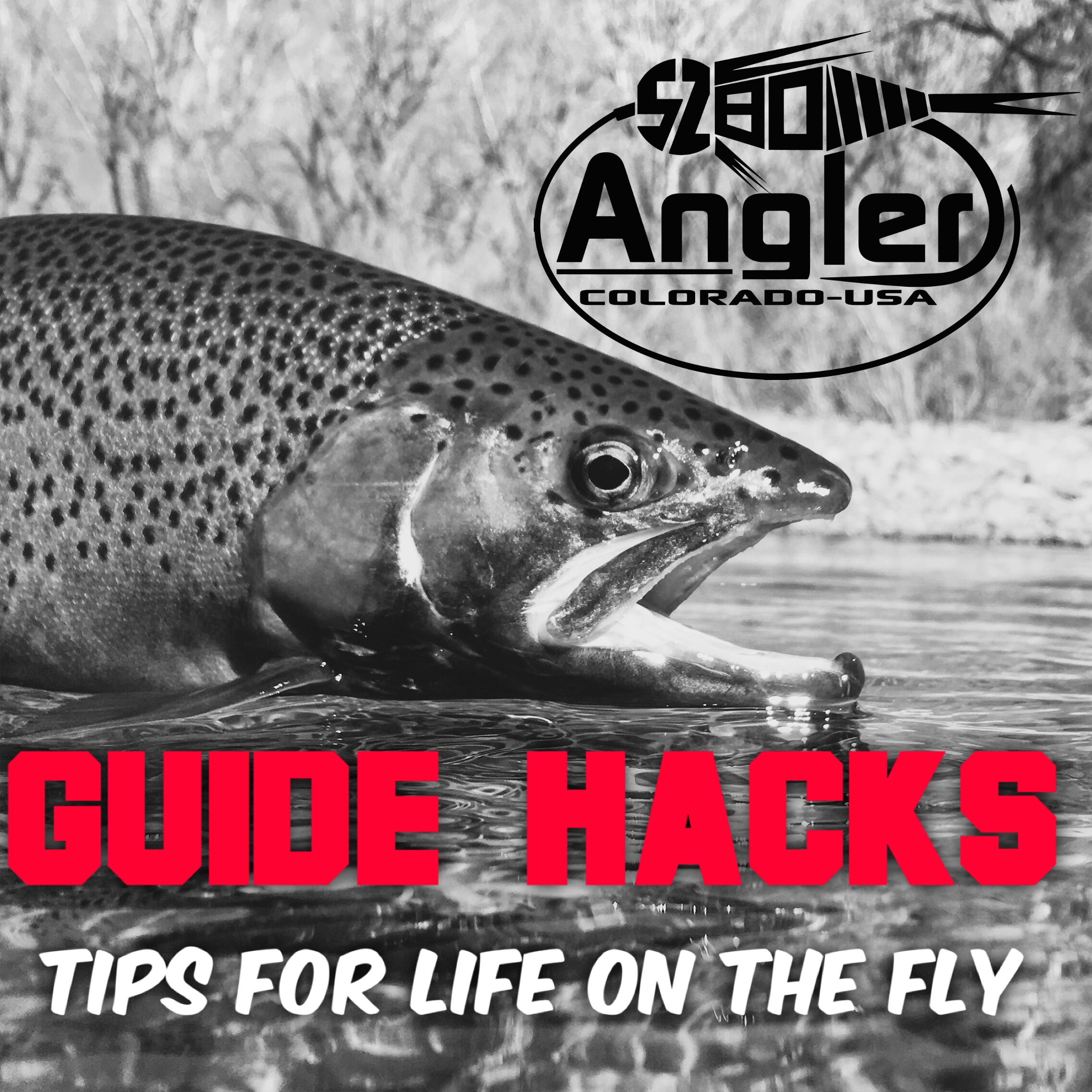
Don’t Let Runoff ‘Put You Down’
Snowpack is 200% of normal as of early June, and rivers have begun to swell with runoff. Unnecessarily, many fly fishermen will pack their rods away until early – mid July when the rivers recede. These unfortunate folks will miss out on some excellent fishing.
When rivers are high, trout, being the energy efficient creatures they are, will be stack into the slower water along the banks. Fish still need to eat regardless of high and murky water. Therefore, fishing can be good, especially when the water clarity improves even marginally. This will happen when the weather cools for a couple days, thus slowing down snow melt. As an example, even a foot of visibility is enough for fish to see your flies. By watching the flow charts and weather reports you will find times when the flows level out or go down. See: http://www.dwr.state.co.us/SurfaceWater/default.aspx for the current stream flow data.
This charts shows a poor option since the flows are increasing daily (top of the ‘wave’ continuing to go up).
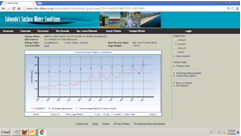
Alternatively, a better choice would be to find data that shows that flows have stabilized/gone down.
There will also be daily fluctuations in the flows and you can coincide your fishing with the lowering flows. It’s also important to understand that it can take several hours for the peak flows to reach a section of river lower in the drainage. Going higher in a drainage can also help get to clearer water since there are less tributaries as you go upstream.
Tailwaters (rivers below dams) can also be excellent high water options. The reservoir will settle silt from the incoming runoff and the outgoing water below the dams will have better clarity. Sometimes water will be held back to fill the reservoirs so watch and take advantage of those situations. Specific locations include Cheesman Canyon, Deckers, The Dream Stream, Boxwood Gulch Ranch, Long Meadow Ranch and below Tarryall Reservoir.
A benefit of high flows is that bigger food sources will get kicked up off of river bottom – stoneflies, crane fly larva, scuds, aquatic worms, earthworms, leeches, and baby fish. It’s time to use those big flies! Darker/bigger profile flies will stand out better in off-color water along with pinks and purples.
It’s important to fish those flies through the water column in those slower sections of water. Fish will sometimes suspend in slow off-colored water since they don’t feel threatened by overhead predators. But, just like normal nymph fishing, keep going deeper if you aren’t picking up fish by adding weight and/or lengthening the distance to the indicator. Or, get rid of the indicator and ‘tight line’ heavier flies. If water clarity improves significantly you also should try to ‘match the hatch’ since the fish will be able to better see the smaller insects.
Be sure to be safe when fishing high flowing water. Don’t step out into the water if you don’t know the depth and most times you can fish from the river banks. One trick is to stick your rod tip (gently) into the water to find out how deep it is next to the bank.
June is also the perfect month to fish lakes with multiple hatches happening and excellent water temperatures for feeding fish. These hatches will start on lower elevation lakes and you can follow them up to middle and higher elevations lakes as the weather warms. Damselflies, dragonflies, calibeatis (lake mayflies), caddis, and midges can all be present, along with leeches, scuds, crayfish and baitfish.
Each of these food sources has a different ‘retrieve’ so presentation is critical as is finding the depth where the fish are at. Use the ‘count down’ method when fishing subsurface on lakes. Fan cast and then let your flies sink – start with counting to 10 by thousands–one thousand, two thousand, three thousand, … Then increase your count on the subsequent set of casts. Once you find the depth fish are at keep with that count.
Where to fish in a lake can a challenge but there are definitely spots more ‘fishy’ than other. Inlets are especially good during runoff since lots of food wash into the lakes. Outlets are also good along with spots that transition from deeper water to flats or shoals, and spots with structure, especially if there are 2 ‘structures’ together (for example a downed tree near a drop off). Just as fish will move into somewhat faster/shallower water to feed in rivers, lake fish will move into shallower water to feed. That happens especially when they feel protection from overhead predators such as when the wind makes a chop on the lake, cloudy periods, or early or late in the day.
Some folks feel that fly fishing lakes can be boring, but when I fish lakes I rarely let the flies sit long since most everything in the lakes moves- bugs, leeches, baitfish, and trout. By stripping/moving your flies- whether they are nymphs, streamers or dries lake fishing becomes more exciting and most times you’ll feel the fish hit which is really fun. Plus, since trout expend a lot less energy in lakes vs rivers, lake fish can grow much larger.
Lake fish can get pretty big!
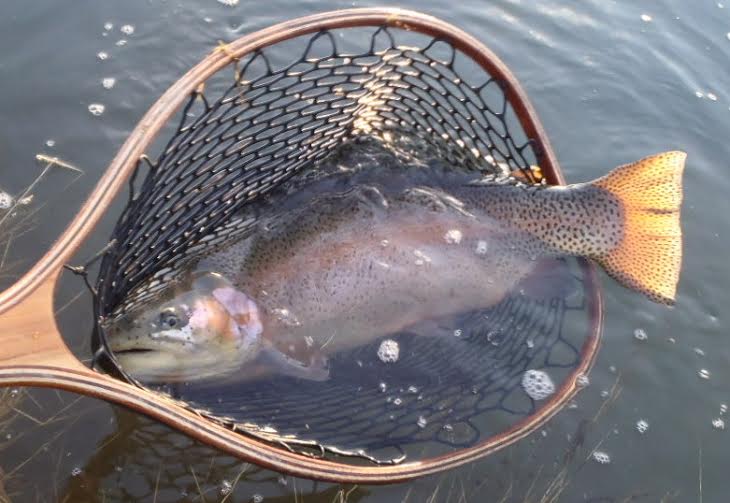
Some of my favorite lake spots to fish and/or guide clients this time of year include Bartle Lakes, the inlets to Lake Dillon, inlet to Georgetown Lake, inlet to Montgomery Reservoir, and the inlet to Fairplay Beach. Other lakes that fish well include Pine Valley Ranch lake (Jefferson County park near Pine), O’Haver Lake south of Salida (bring your tent or camper), Clinton Reservoir on Fremont Pass, Chrystal Lake near Leadville, Tarryall Reservoir (especially good to belly boat), Silver Valley Lake (near SilverPlume), Empire Lake, Rainbow Falls, and lakes in Rocky Mountain National Park.
Don’t let high water deter your fishing and ‘put you down’. You’ll just need to adjust your tactics on the river or try lake fishing which can be rewarding and provide some of the biggest fish of the year. Have fun out there!
To book your guided trip with Tom Caprio, CONTACT US today!


